第八章 动词 课件(共40张PPT) 2024年中考英语二轮专题复习(广东专版)
文档属性
| 名称 | 第八章 动词 课件(共40张PPT) 2024年中考英语二轮专题复习(广东专版) | 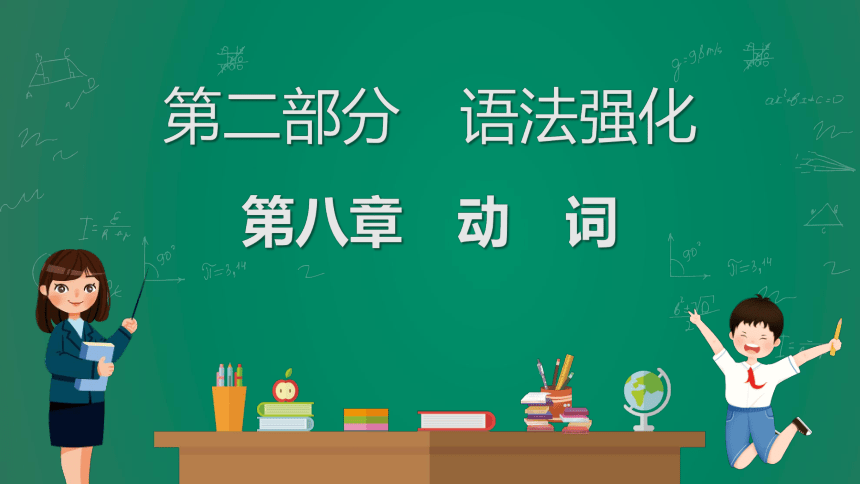 | |
| 格式 | pptx | ||
| 文件大小 | 3.0MB | ||
| 资源类型 | 教案 | ||
| 版本资源 | 通用版 | ||
| 科目 | 英语 | ||
| 更新时间 | 2024-06-02 17:43:02 | ||
图片预览

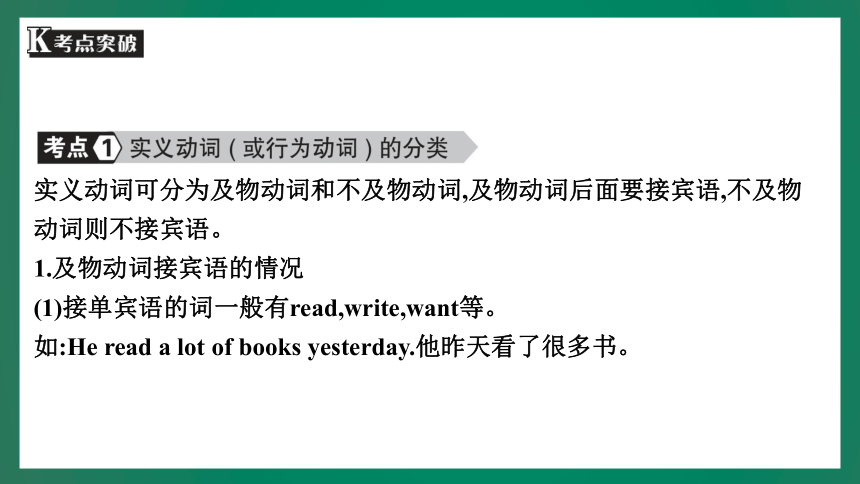
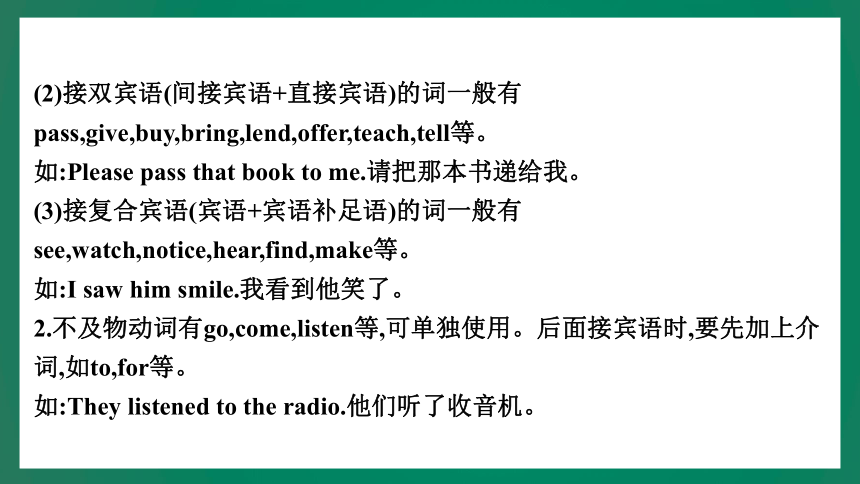
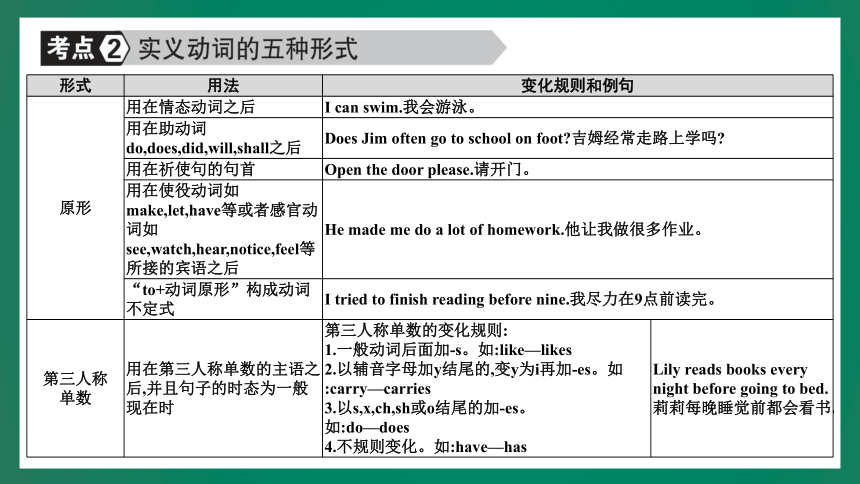
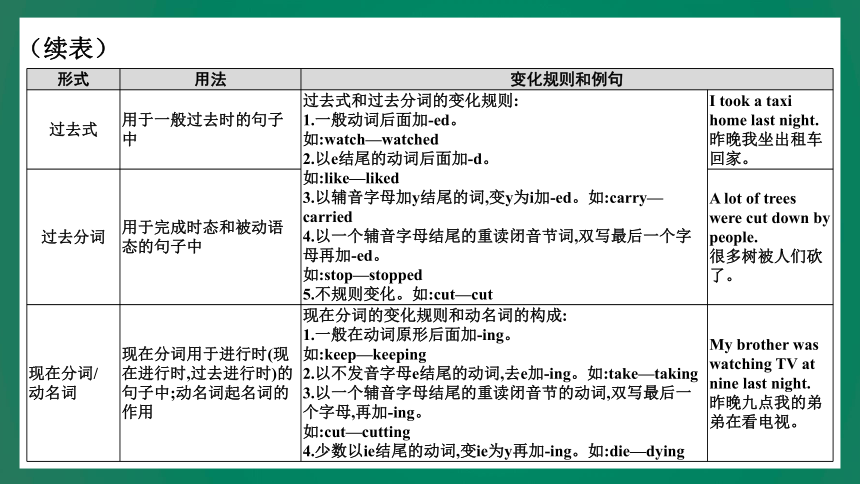
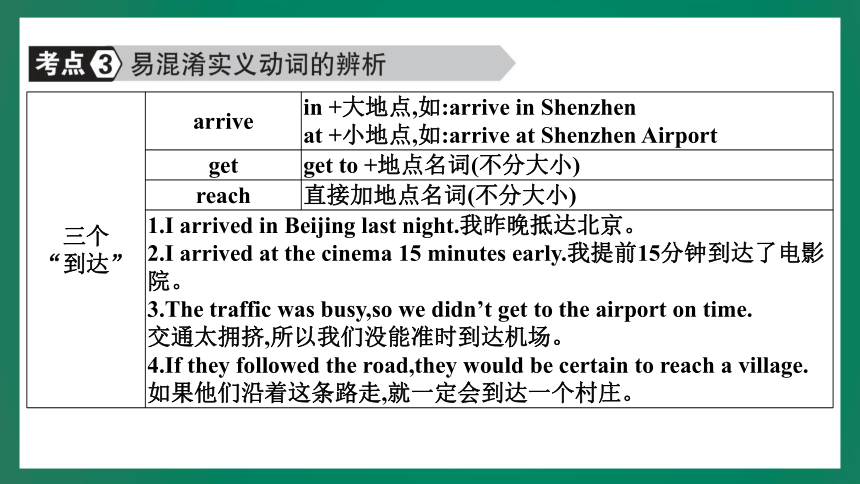
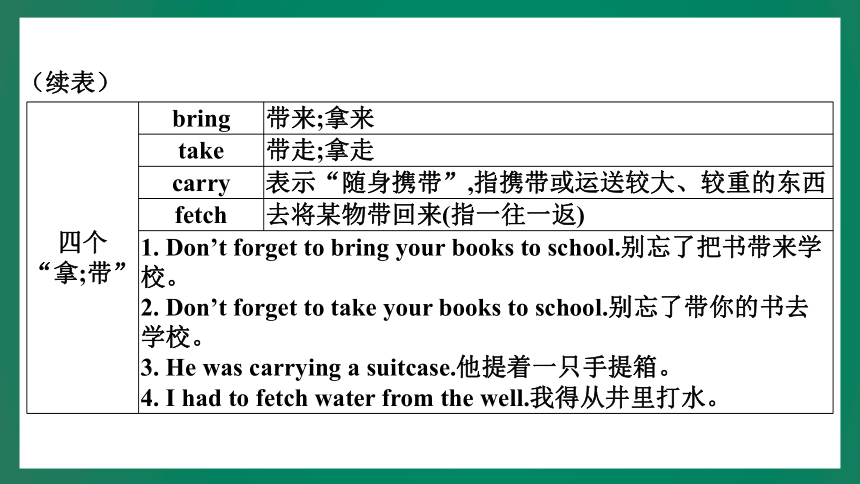
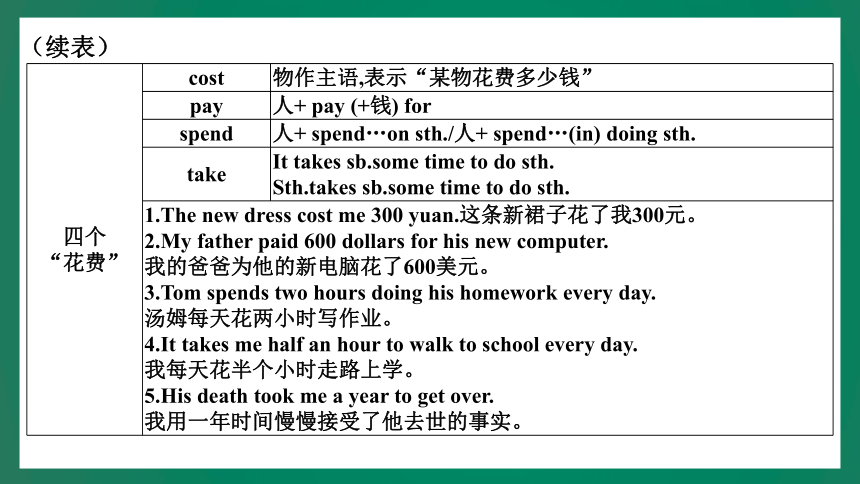
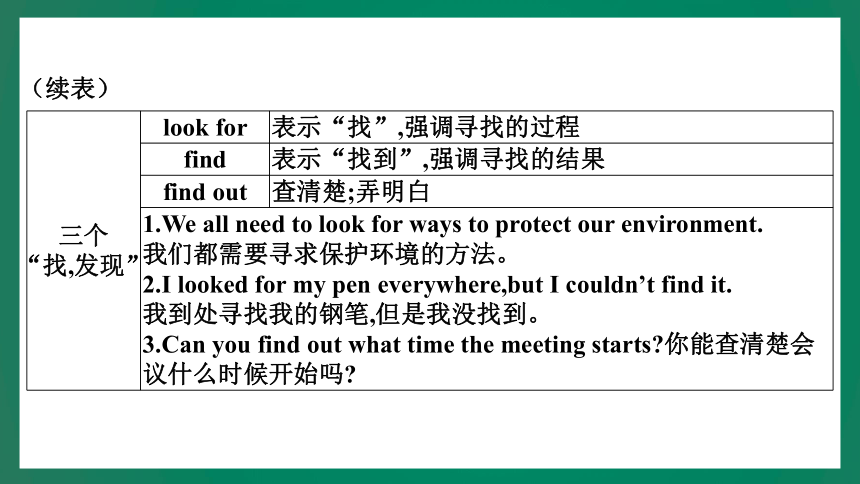
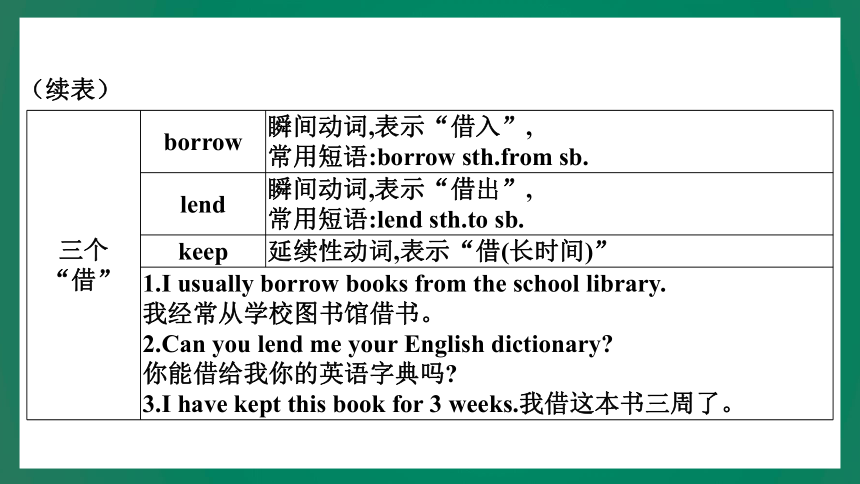
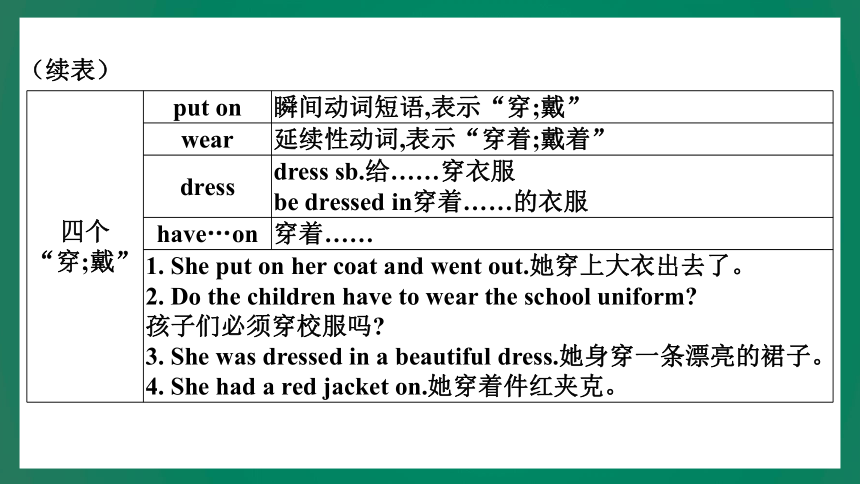
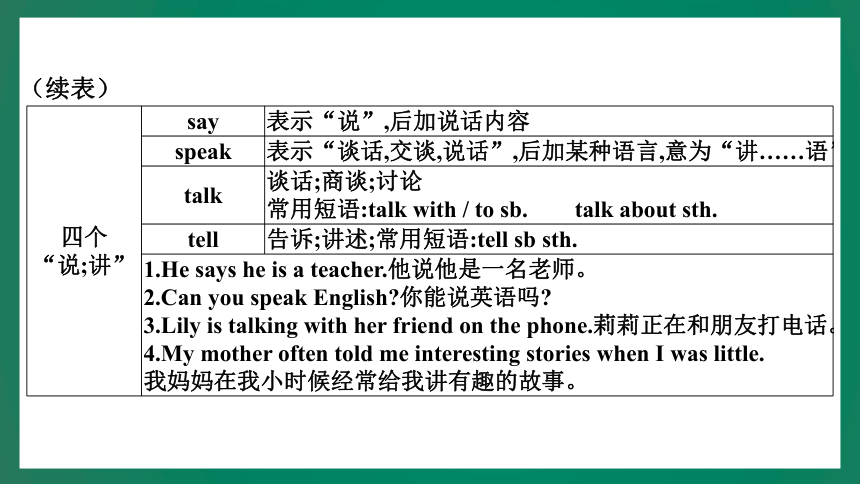
文档简介
(共40张PPT)
第八章 动 词
第二部分 语法强化
实义动词可分为及物动词和不及物动词,及物动词后面要接宾语,不及物动词则不接宾语。
1.及物动词接宾语的情况
(1)接单宾语的词一般有read,write,want等。
如:He read a lot of books yesterday.他昨天看了很多书。
(2)接双宾语(间接宾语+直接宾语)的词一般有pass,give,buy,bring,lend,offer,teach,tell等。
如:Please pass that book to me.请把那本书递给我。
(3)接复合宾语(宾语+宾语补足语)的词一般有see,watch,notice,hear,find,make等。
如:I saw him smile.我看到他笑了。
2.不及物动词有go,come,listen等,可单独使用。后面接宾语时,要先加上介词,如to,for等。
如:They listened to the radio.他们听了收音机。
形式 用法 变化规则和例句
原形 用在情态动词之后 I can swim.我会游泳。
用在助动词do,does,did,will,shall之后 Does Jim often go to school on foot 吉姆经常走路上学吗
用在祈使句的句首 Open the door please.请开门。
用在使役动词如make,let,have等或者感官动词如see,watch,hear,notice,feel等所接的宾语之后 He made me do a lot of homework.他让我做很多作业。
“to+动词原形”构成动词不定式 I tried to finish reading before nine.我尽力在9点前读完。
第三人称 单数 用在第三人称单数的主语之后,并且句子的时态为一般现在时 第三人称单数的变化规则: 1.一般动词后面加-s。如:like—likes 2.以辅音字母加y结尾的,变y为i再加-es。如:carry—carries 3.以s,x,ch,sh或o结尾的加-es。 如:do—does 4.不规则变化。如:have—has Lily reads books every night before going to bed.
莉莉每晚睡觉前都会看书。
(续表)
形式 用法 变化规则和例句
过去式 用于一般过去时的句子中 过去式和过去分词的变化规则: 1.一般动词后面加-ed。 如:watch—watched 2.以e结尾的动词后面加-d。 如:like—liked 3.以辅音字母加y结尾的词,变y为i加-ed。如:carry—carried 4.以一个辅音字母结尾的重读闭音节词,双写最后一个字母再加-ed。 如:stop—stopped 5.不规则变化。如:cut—cut I took a taxi home last night.
昨晚我坐出租车回家。
过去分词 用于完成时态和被动语态的句子中 A lot of trees were cut down by people.
很多树被人们砍了。
现在分词/ 动名词 现在分词用于进行时(现在进行时,过去进行时)的句子中;动名词起名词的作用 现在分词的变化规则和动名词的构成: 1.一般在动词原形后面加-ing。 如:keep—keeping 2.以不发音字母e结尾的动词,去e加-ing。如:take—taking 3.以一个辅音字母结尾的重读闭音节的动词,双写最后一个字母,再加-ing。 如:cut—cutting 4.少数以ie结尾的动词,变ie为y再加-ing。如:die—dying My brother was watching TV at nine last night.
昨晚九点我的弟弟在看电视。
三个 “到达” arrive in +大地点,如:arrive in Shenzhen
at +小地点,如:arrive at Shenzhen Airport
get get to +地点名词(不分大小)
reach 直接加地点名词(不分大小)
1.I arrived in Beijing last night.我昨晚抵达北京。 2.I arrived at the cinema 15 minutes early.我提前15分钟到达了电影院。 3.The traffic was busy,so we didn’t get to the airport on time. 交通太拥挤,所以我们没能准时到达机场。 4.If they followed the road,they would be certain to reach a village. 如果他们沿着这条路走,就一定会到达一个村庄。
(续表)
四个 “拿;带” bring 带来;拿来
take 带走;拿走
carry 表示“随身携带”,指携带或运送较大、较重的东西
fetch 去将某物带回来(指一往一返)
1. Don’t forget to bring your books to school.别忘了把书带来学校。 2. Don’t forget to take your books to school.别忘了带你的书去学校。 3. He was carrying a suitcase.他提着一只手提箱。 4. I had to fetch water from the well.我得从井里打水。
(续表)
四个 “花费” cost 物作主语,表示“某物花费多少钱”
pay 人+ pay (+钱) for
spend 人+ spend…on sth./人+ spend…(in) doing sth.
take It takes sb.some time to do sth.
Sth.takes sb.some time to do sth.
1.The new dress cost me 300 yuan.这条新裙子花了我300元。 2.My father paid 600 dollars for his new computer. 我的爸爸为他的新电脑花了600美元。 3.Tom spends two hours doing his homework every day. 汤姆每天花两小时写作业。 4.It takes me half an hour to walk to school every day. 我每天花半个小时走路上学。 5.His death took me a year to get over. 我用一年时间慢慢接受了他去世的事实。
(续表)
三个 “找,发现” look for 表示“找”,强调寻找的过程
find 表示“找到”,强调寻找的结果
find out 查清楚;弄明白
1.We all need to look for ways to protect our environment. 我们都需要寻求保护环境的方法。 2.I looked for my pen everywhere,but I couldn’t find it. 我到处寻找我的钢笔,但是我没找到。 3.Can you find out what time the meeting starts 你能查清楚会议什么时候开始吗
(续表)
三个 “借” borrow 瞬间动词,表示“借入”,
常用短语:borrow sth.from sb.
lend 瞬间动词,表示“借出”,
常用短语:lend sth.to sb.
keep 延续性动词,表示“借(长时间)”
1.I usually borrow books from the school library. 我经常从学校图书馆借书。 2.Can you lend me your English dictionary 你能借给我你的英语字典吗 3.I have kept this book for 3 weeks.我借这本书三周了。
(续表)
四个 “穿;戴” put on 瞬间动词短语,表示“穿;戴”
wear 延续性动词,表示“穿着;戴着”
dress dress sb.给……穿衣服
be dressed in穿着……的衣服
have…on 穿着……
1. She put on her coat and went out.她穿上大衣出去了。 2. Do the children have to wear the school uniform 孩子们必须穿校服吗 3. She was dressed in a beautiful dress.她身穿一条漂亮的裙子。 4. She had a red jacket on.她穿着件红夹克。
(续表)
四个 “说;讲” say 表示“说”,后加说话内容
speak 表示“谈话,交谈,说话”,后加某种语言,意为“讲……语”
talk 谈话;商谈;讨论
常用短语:talk with / to sb. talk about sth.
tell 告诉;讲述;常用短语:tell sb sth.
1.He says he is a teacher.他说他是一名老师。 2.Can you speak English 你能说英语吗 3.Lily is talking with her friend on the phone.莉莉正在和朋友打电话。 4.My mother often told me interesting stories when I was little. 我妈妈在我小时候经常给我讲有趣的故事。
(续表)
四个 “看” see 表示“看到”,强调看的结果
watch 表示“观看;观赏”,例如看电视、比赛或演出等
look 不及物动词,强调看的动作
read 表示“看(书;报纸)”,指阅读
1.I saw some pandas in the zoo.我在动物园看到了一些熊猫。 2.Ben likes watching football matches on TV.本喜欢在电视上看足球赛。 3.She looked at me and smiled.她看了看我,笑了。 4.My father reads newspapers every morning.我爸爸每天早上都看报。
两个 “听” listen 表示“听”,强调听的动作,常用短语:listen to
hear 表示“听到”,强调听的结果
1.Do you like listening to music 你喜欢听音乐吗 2.Can you hear me 你能听到我说话吗
(续表)
四个 “输赢” win 表示“赢得”,后加比赛或奖项
beat 表示“击败”,后加对手
fail 表示“失败;未做成(某事)”,后加考试或to do sth.
lose 表示“输掉”,后加比赛
1.He was very happy after winning the competition.他赢了那场比赛后高兴极了。 2.He beat me at chess.他下棋赢了我。 3.Linda feels very sad because she failed her English exam. 琳达很难过,因为她英语考试不及格。 4.Our team lost the basketball match,but we still had a great time. 虽然我们队输掉了这场篮球赛,但我们仍然玩得很开心。
(续表)
四个 “参加” join 加入组织、军队、群体并成为其中一员
take part in 参加聚会或活动并发挥作用
join in 参加聚会或活动
attend 定期出席、参加会议、上学、参加婚礼、参加葬礼
1.I want to join the basketball club.我想加入篮球俱乐部。 2.Many students enjoy taking part in different kinds of after-school activities. 很多学生喜欢参加各种各样的课外活动。 3.Be prepared to join in a class discussion.一定准备好参加班级讨论。 4.Please let us know if you cannot attend the meeting.你若不能参加会议,请通知我们。
(续表)
五个 “变化” become 天气、感情、身份、职位、身体状况或社会的变化
turn 颜色变化
get 天变黑、变长或变短,后加形容词或to do sth.
grow 逐渐变化成新的状态,指长大、长高、增多、增强等
go 常用表达向坏的方向变化,如:go bad变质
1.The Internet has become part of everyday life.互联网已成为日常生活的一部分。 2.The leaves were turning yellow.叶子变黄了。 3.The day is getting longer.白天渐渐变长了。 4.As her confidence grows you may find that she looks more beautiful than before. 随着她自信心的增强,你可能会发现她看起来比以前更漂亮了。 5.Fish soon goes bad in hot weather.天气热时鱼很快变坏。
(续表)
两个 “必须” must 表示“必须”,强调说话人主观上认为有义务、有必要
have to 表示“不得不”,多出于不得已,着重于客观的需要,有人称及时态变化
1.You must finish your homework before 9:00.你必须在9点前完成作业。 2.My bike is broken,so I have to go to school by bus today. 我的自行车坏了,所以我不得不乘公共汽车去上学。
两个 “接收” receive 收到
accept 接受
1.I receive many birthday gifts every year.我每年都收到很多生日礼物。 2.I accepted his invitation to his birthday party.我接受了参加他生日派对的邀请。
(续表)
两个 “忘记” forget 表示“忘记”,forget +名词/ to do sth./ doing sth.
leave 表示“落在……”,leave +名词+介词+地点
1.I forgot to close the window when I went out.我出门的时候忘记关窗了。 2.My sister left her Chinese book at home.我妹妹把她的语文书落在家里了。
一个 “发明”, 一个 “发现” invent 发明
discover 发现
1.Who invented the telephone 谁发明了电话 2.We discovered this beach while we were sailing around the island. 我们在围绕这个海岛航行时发现了这个海滩。
系动词有表示状态、感官、持续、变化、表象、终止等几种类型。
1.状态系动词:用来表示主语的状态,只有be动词。
2.感官系动词。如:
feel 觉得;摸上去 smell 闻起来 sound 听起来
taste 尝起来 look 看起来
3.持续系动词:用来表示主语继续或保持一种状况或态度。如:
keep 保持 remain 仍是 stay 继续处于……状态
lie 处于……状态 stand 处于……状态
4.变化系动词:表示主语变成什么样。如:
become 变成;成为 grow 变得;变成 turn 变成;成为
fall 开始变得 get 开始成为 go 变成;变得
come 进入(某种状态) run 变成;成为
5.表象系动词:用来表示“看起来”。如:
seem 似乎是 appear 显得;看起来好像 look 看起来
6.终止系动词:表示主语已终止动作,表“证实”之意。如:
prove 证明 turn out 证明是;结果是
常见的情态动词有:can / could(能),may / might(可以),must(必须),
should(应该),had better(最好),need(需要),have to(不得不)
情态动词不能单独作谓语,后接动词原形作谓语。没有人称和数的变化。其句型结构为:
1.陈述句:主语+情态动词+动词原形+其他部分
2.否定句:主语+情态动词+not+动词原形+其他部分
3.一般疑问句:情态动词+主语+动词原形+其他部分
肯定回答:Yes,主语+情态动词
否定回答:No,主语+情态动词+not
注意:
(1)may(可以) 开头的疑问句的否定回答用mustn’t,can’t或may not。以must (必须) 开头的疑问句的否定回答用 needn’t 或don’t have to。
(2)情态动词表示推测时有三种情况:表示“一定是”时用must be;表示“可能”时用 may be;表示“不可能”时用 can’t be。
(3)询问“某人是否一定要做某事”的结构:
— Must I …
— Yes,you must./No,you needn’t / don’t have to.
1.need 的用法
(1)need作行为动词时有人称和数的变化,后面可接名词、代词、动名词及带to的动词不定式,可用于肯定句、否定句和疑问句中。基本句式如下:
①当主语是人时:
肯定句:sb.need sth./ sb.need + to do sth.
否定句:sb.don’t / doesn’t / didn’t + need to do sth.
疑问句:Do / Does / Did sb.+ need to do sth.
肯定回答:Yes,sb.do / does / did.
否定回答:No,sb.don’t / doesn’t / didn’t.
②当主语是物时:sth.need doing=sth.need to be done
(2)need可作情态动词(常用于否定句和疑问句),其后接动词原形。基本句型如下:
否定句:needn’t do sth.如:He needn’t water the flowers every day.他不需要每天浇花。
疑问句:Need sb.do sth. 如:Need he water the flowers every day 他需要每天浇花吗
肯定回答:Yes,sb.must.如:Yes,he must.是的,他需要。
否定回答:No,sb.needn’t./ No,sb.don’t have to. 如:No,he needn’t.不,他不需要。
(3)need可作名词:
如:There’s no need to stay here any longer.没有必要再待在这儿。
A friend in need is a friend indeed.患难见真情。
2.be able to 的用法
be able to 有人称、数和时态的变化。表示能力时,可以和can互换。
如:I do hope you’ll be able to come to the wedding.我很希望你能来参加婚礼。
He told me,“I am able to create this work because I am expert in this field.”
他告诉我,“我可以创作这件作品,因为我是这个领域的行家。”
3.may be和maybe的用法与区别
may be表示“可能;也许”,一般用在句中(情态动词+be);maybe是副词,表示“可能;也许”,一般用在句首。
如:He may be in the office,but I am not sure.他可能在办公室,但是我不确定。
Maybe she is in love.她可能是恋爱了。
4.had better的用法
had better do sth./ had better not do sth.最好做某事 / 最好不做某事
如:It’s cold.We had better go home.天冷了,咱们还是回家吧。
5.have to 的用法
(1)have to 和must 都有“必须”的意思。have to 侧重客观;must 侧重说话人的主观看法。
(2)have to 有人称、数和多种时态的变化。要借助do,did 和does 等助动词帮助改为疑问句和否定句。
如:He has to stay up late because of too much homework.因为作业太多,他不得不熬夜。
Did you have to get through an entrance exam 你必须要通过入学考试吗
6.would rather的用法
would rather do sth. 宁愿做某事
would rather not do sth. 宁愿不做某事
would rather do sth.than do sth. 宁愿做某事而不愿做某事
如:I would rather have the small one than the big one. 我宁愿要小的,不要大的。
He would rather watch TV at home than go to the cinema. 他宁可在家看电视而不愿去看电影。
即学即练
一、用括号里所给单词的适当形式填空。
1.The table needs .= The table needs
.(paint)
2.Do you need (buy) some school things
3.You don’t need (do) it yourself.
4.It seems to rain,so you had better (take) an umbrella with you.
5.She said she would rather (play) the piano than (see) a film.
see
play
take
to do
to buy
to be painted
painting
二、用maybe、may be或者情态动词填空。
1.— Can you guess what he does
— He a teacher.
2.— How will you go to the garden tomorrow
— I will take a taxi.
3.— Must I finish this report this afternoon.
— No,you .
4.— Is this book Lily’s
— No,it be hers.Anna’s name is on the cover.
5.— I find I easily catch a cold these days.What I do
— I think you do more exercise.
should / can
should / can
can’t
needn’t / don’t have to
Maybe
may be
三、单项选择。
( )1.(2023·河北省中考)If we _______find a better way,we’ll finish the job faster.
A.can B.can’t C.must D.mustn’t
( )2.(2023·武汉市中考)— Excuse me,but we _______wait in line to get on the subway.
— I’m sorry.
A.might B.would C.could D.should
( )3.(2023·岳阳市中考改编)The teacher tells students to _______new words in a dictionary.
A.look after B.look up C.look for D.look through
B
D
A
( )4.(2023·河北省中考)We are supposed to _______our hand before we speak in class.
A.put up B.put out C.put down D.put away
( )5.(2023·武汉市中考)— Sally _______into the role of our group leader.
— Really I’m expecting fresh air and new ideas from her.
A.ran B.broke C.stepped D.looked
( )6.(2023·滨州市中考)— Our parents often _______us not to talk with strangers on the Internet.
— That’s true.As teenagers,we should learn to protect ourselves.
A.warn B.invite C.control D.promise
A
C
A
( )7.(2023·白银市中考)I _______at 6 a.m.so I can leave for school at 7 a.m.
A.get up B.put up C.take after D.get on
( )8.(2023·武汉市中考)— Hard to believe.Luke won the school speech contest!
— He used to be shy,but his friends’ support _______his confidence.
A.took away B.made up C.put away D.built up
( )9.(2023·滨州市中考)— Do you know the astronaut Wang Yaping
— Sure.She is a great woman who can _______her dreams.I really look up to her.
A.pay for B.stick to C.lay out D.set out
B
D
A
( )10.(2023·白银市中考)— I _______find my keys.
— Have you checked in your jacket pockets
A.mustn’t B.shouldn’t C.can’t D.wouldn’t
( )11.(2023·武汉市中考)— The hair product is being _______at present.
— You mean if it’s up to the standard,it will be put on the market soon.
A.used B.tested C.shown D.sold
( )12.(2023·扬州市中考)I _______China for three months and this is the first time I’ve tried on hanfu.
A.have gone to B.have been to
C.have arrived in D.have been in
D
B
C
( )13.(2023·滨州市中考)— The paper cutting is pretty lively.Who made it
— It _______be Mary.None of us except her is able to do it.
A.can B.must C.need D.might
( )14.(2023·扬州市中考)We don’t _______much from the kids because they can’t understand the value of this work.
A.express B.excuse C.expect D.explain
( )15.(2023·天津市中考)— Would you like to visit Tianjin University tomorrow
— Sorry,I’m afraid I _______.I’ll work as a volunteer in my community.
A.can B.can’t C.must D.mustn’t
B
C
B
( )16.(2023·扬州市中考)Paper cut-outs of “double happiness” are often _______in the married couple’s home to bring good wishes.
A.put back B.put up C.put on D.put off
( )17.(2023·天津市中考)To keep healthy,Daming’s grandparents _______in a park every day.
A.exercise B.cough C.sleep D.wait
( )18.(2023·江西省中考)— Hello! Can I speak to Jenny,please
— Sorry,she isn’t in.Can I _______a message
A.take B.read C.check D.receive
A
A
B
( )19.(2023·安徽省中考)Our team _______what to do about the project and successfully completed it on time.
A.gave up B.worked out C.turned down D.took away
( )20.(2023·天津市中考)Lisa is a popular monitor.She _______her classmates and teachers.
A.takes part in B.gets on well with
C.gets into trouble with D.keeps clear of
( )21.(2023·自贡市中考)— Ms.White,I am sad that I didn’t pass the test.
— Keep trying.Success _______hard work.
A.depends on B.gives away C.leads to D.goes off
A
B
B
( )22.(2023·云南省中考)It’s a good habit to _______the lights when you leave a room.
A.turn down B.turn up C.turn off D.turn on
( )23.(2023·自贡市中考改编)— Could I _______the book for two more days
— Sorry,you can’t.You must follow our rules.
A.borrow B.lend C.keep D.take
C
C
( )24.(2023·泸州市中考)— I’m worried about leaving my friends and going to a new school.
— Take it easy.I’m sure you’ll _______your classmates if you are friendly to them.
A.get along with B.catch up with
C.get together with D.come up with
( )25.(2022·扬州市中考真题)People in cold areas _______warm colours to calm colours in their homes.
A.protect B.prefer C.pronounce D.practise
B
A
谢 谢 观 看
第八章 动 词
第二部分 语法强化
实义动词可分为及物动词和不及物动词,及物动词后面要接宾语,不及物动词则不接宾语。
1.及物动词接宾语的情况
(1)接单宾语的词一般有read,write,want等。
如:He read a lot of books yesterday.他昨天看了很多书。
(2)接双宾语(间接宾语+直接宾语)的词一般有pass,give,buy,bring,lend,offer,teach,tell等。
如:Please pass that book to me.请把那本书递给我。
(3)接复合宾语(宾语+宾语补足语)的词一般有see,watch,notice,hear,find,make等。
如:I saw him smile.我看到他笑了。
2.不及物动词有go,come,listen等,可单独使用。后面接宾语时,要先加上介词,如to,for等。
如:They listened to the radio.他们听了收音机。
形式 用法 变化规则和例句
原形 用在情态动词之后 I can swim.我会游泳。
用在助动词do,does,did,will,shall之后 Does Jim often go to school on foot 吉姆经常走路上学吗
用在祈使句的句首 Open the door please.请开门。
用在使役动词如make,let,have等或者感官动词如see,watch,hear,notice,feel等所接的宾语之后 He made me do a lot of homework.他让我做很多作业。
“to+动词原形”构成动词不定式 I tried to finish reading before nine.我尽力在9点前读完。
第三人称 单数 用在第三人称单数的主语之后,并且句子的时态为一般现在时 第三人称单数的变化规则: 1.一般动词后面加-s。如:like—likes 2.以辅音字母加y结尾的,变y为i再加-es。如:carry—carries 3.以s,x,ch,sh或o结尾的加-es。 如:do—does 4.不规则变化。如:have—has Lily reads books every night before going to bed.
莉莉每晚睡觉前都会看书。
(续表)
形式 用法 变化规则和例句
过去式 用于一般过去时的句子中 过去式和过去分词的变化规则: 1.一般动词后面加-ed。 如:watch—watched 2.以e结尾的动词后面加-d。 如:like—liked 3.以辅音字母加y结尾的词,变y为i加-ed。如:carry—carried 4.以一个辅音字母结尾的重读闭音节词,双写最后一个字母再加-ed。 如:stop—stopped 5.不规则变化。如:cut—cut I took a taxi home last night.
昨晚我坐出租车回家。
过去分词 用于完成时态和被动语态的句子中 A lot of trees were cut down by people.
很多树被人们砍了。
现在分词/ 动名词 现在分词用于进行时(现在进行时,过去进行时)的句子中;动名词起名词的作用 现在分词的变化规则和动名词的构成: 1.一般在动词原形后面加-ing。 如:keep—keeping 2.以不发音字母e结尾的动词,去e加-ing。如:take—taking 3.以一个辅音字母结尾的重读闭音节的动词,双写最后一个字母,再加-ing。 如:cut—cutting 4.少数以ie结尾的动词,变ie为y再加-ing。如:die—dying My brother was watching TV at nine last night.
昨晚九点我的弟弟在看电视。
三个 “到达” arrive in +大地点,如:arrive in Shenzhen
at +小地点,如:arrive at Shenzhen Airport
get get to +地点名词(不分大小)
reach 直接加地点名词(不分大小)
1.I arrived in Beijing last night.我昨晚抵达北京。 2.I arrived at the cinema 15 minutes early.我提前15分钟到达了电影院。 3.The traffic was busy,so we didn’t get to the airport on time. 交通太拥挤,所以我们没能准时到达机场。 4.If they followed the road,they would be certain to reach a village. 如果他们沿着这条路走,就一定会到达一个村庄。
(续表)
四个 “拿;带” bring 带来;拿来
take 带走;拿走
carry 表示“随身携带”,指携带或运送较大、较重的东西
fetch 去将某物带回来(指一往一返)
1. Don’t forget to bring your books to school.别忘了把书带来学校。 2. Don’t forget to take your books to school.别忘了带你的书去学校。 3. He was carrying a suitcase.他提着一只手提箱。 4. I had to fetch water from the well.我得从井里打水。
(续表)
四个 “花费” cost 物作主语,表示“某物花费多少钱”
pay 人+ pay (+钱) for
spend 人+ spend…on sth./人+ spend…(in) doing sth.
take It takes sb.some time to do sth.
Sth.takes sb.some time to do sth.
1.The new dress cost me 300 yuan.这条新裙子花了我300元。 2.My father paid 600 dollars for his new computer. 我的爸爸为他的新电脑花了600美元。 3.Tom spends two hours doing his homework every day. 汤姆每天花两小时写作业。 4.It takes me half an hour to walk to school every day. 我每天花半个小时走路上学。 5.His death took me a year to get over. 我用一年时间慢慢接受了他去世的事实。
(续表)
三个 “找,发现” look for 表示“找”,强调寻找的过程
find 表示“找到”,强调寻找的结果
find out 查清楚;弄明白
1.We all need to look for ways to protect our environment. 我们都需要寻求保护环境的方法。 2.I looked for my pen everywhere,but I couldn’t find it. 我到处寻找我的钢笔,但是我没找到。 3.Can you find out what time the meeting starts 你能查清楚会议什么时候开始吗
(续表)
三个 “借” borrow 瞬间动词,表示“借入”,
常用短语:borrow sth.from sb.
lend 瞬间动词,表示“借出”,
常用短语:lend sth.to sb.
keep 延续性动词,表示“借(长时间)”
1.I usually borrow books from the school library. 我经常从学校图书馆借书。 2.Can you lend me your English dictionary 你能借给我你的英语字典吗 3.I have kept this book for 3 weeks.我借这本书三周了。
(续表)
四个 “穿;戴” put on 瞬间动词短语,表示“穿;戴”
wear 延续性动词,表示“穿着;戴着”
dress dress sb.给……穿衣服
be dressed in穿着……的衣服
have…on 穿着……
1. She put on her coat and went out.她穿上大衣出去了。 2. Do the children have to wear the school uniform 孩子们必须穿校服吗 3. She was dressed in a beautiful dress.她身穿一条漂亮的裙子。 4. She had a red jacket on.她穿着件红夹克。
(续表)
四个 “说;讲” say 表示“说”,后加说话内容
speak 表示“谈话,交谈,说话”,后加某种语言,意为“讲……语”
talk 谈话;商谈;讨论
常用短语:talk with / to sb. talk about sth.
tell 告诉;讲述;常用短语:tell sb sth.
1.He says he is a teacher.他说他是一名老师。 2.Can you speak English 你能说英语吗 3.Lily is talking with her friend on the phone.莉莉正在和朋友打电话。 4.My mother often told me interesting stories when I was little. 我妈妈在我小时候经常给我讲有趣的故事。
(续表)
四个 “看” see 表示“看到”,强调看的结果
watch 表示“观看;观赏”,例如看电视、比赛或演出等
look 不及物动词,强调看的动作
read 表示“看(书;报纸)”,指阅读
1.I saw some pandas in the zoo.我在动物园看到了一些熊猫。 2.Ben likes watching football matches on TV.本喜欢在电视上看足球赛。 3.She looked at me and smiled.她看了看我,笑了。 4.My father reads newspapers every morning.我爸爸每天早上都看报。
两个 “听” listen 表示“听”,强调听的动作,常用短语:listen to
hear 表示“听到”,强调听的结果
1.Do you like listening to music 你喜欢听音乐吗 2.Can you hear me 你能听到我说话吗
(续表)
四个 “输赢” win 表示“赢得”,后加比赛或奖项
beat 表示“击败”,后加对手
fail 表示“失败;未做成(某事)”,后加考试或to do sth.
lose 表示“输掉”,后加比赛
1.He was very happy after winning the competition.他赢了那场比赛后高兴极了。 2.He beat me at chess.他下棋赢了我。 3.Linda feels very sad because she failed her English exam. 琳达很难过,因为她英语考试不及格。 4.Our team lost the basketball match,but we still had a great time. 虽然我们队输掉了这场篮球赛,但我们仍然玩得很开心。
(续表)
四个 “参加” join 加入组织、军队、群体并成为其中一员
take part in 参加聚会或活动并发挥作用
join in 参加聚会或活动
attend 定期出席、参加会议、上学、参加婚礼、参加葬礼
1.I want to join the basketball club.我想加入篮球俱乐部。 2.Many students enjoy taking part in different kinds of after-school activities. 很多学生喜欢参加各种各样的课外活动。 3.Be prepared to join in a class discussion.一定准备好参加班级讨论。 4.Please let us know if you cannot attend the meeting.你若不能参加会议,请通知我们。
(续表)
五个 “变化” become 天气、感情、身份、职位、身体状况或社会的变化
turn 颜色变化
get 天变黑、变长或变短,后加形容词或to do sth.
grow 逐渐变化成新的状态,指长大、长高、增多、增强等
go 常用表达向坏的方向变化,如:go bad变质
1.The Internet has become part of everyday life.互联网已成为日常生活的一部分。 2.The leaves were turning yellow.叶子变黄了。 3.The day is getting longer.白天渐渐变长了。 4.As her confidence grows you may find that she looks more beautiful than before. 随着她自信心的增强,你可能会发现她看起来比以前更漂亮了。 5.Fish soon goes bad in hot weather.天气热时鱼很快变坏。
(续表)
两个 “必须” must 表示“必须”,强调说话人主观上认为有义务、有必要
have to 表示“不得不”,多出于不得已,着重于客观的需要,有人称及时态变化
1.You must finish your homework before 9:00.你必须在9点前完成作业。 2.My bike is broken,so I have to go to school by bus today. 我的自行车坏了,所以我不得不乘公共汽车去上学。
两个 “接收” receive 收到
accept 接受
1.I receive many birthday gifts every year.我每年都收到很多生日礼物。 2.I accepted his invitation to his birthday party.我接受了参加他生日派对的邀请。
(续表)
两个 “忘记” forget 表示“忘记”,forget +名词/ to do sth./ doing sth.
leave 表示“落在……”,leave +名词+介词+地点
1.I forgot to close the window when I went out.我出门的时候忘记关窗了。 2.My sister left her Chinese book at home.我妹妹把她的语文书落在家里了。
一个 “发明”, 一个 “发现” invent 发明
discover 发现
1.Who invented the telephone 谁发明了电话 2.We discovered this beach while we were sailing around the island. 我们在围绕这个海岛航行时发现了这个海滩。
系动词有表示状态、感官、持续、变化、表象、终止等几种类型。
1.状态系动词:用来表示主语的状态,只有be动词。
2.感官系动词。如:
feel 觉得;摸上去 smell 闻起来 sound 听起来
taste 尝起来 look 看起来
3.持续系动词:用来表示主语继续或保持一种状况或态度。如:
keep 保持 remain 仍是 stay 继续处于……状态
lie 处于……状态 stand 处于……状态
4.变化系动词:表示主语变成什么样。如:
become 变成;成为 grow 变得;变成 turn 变成;成为
fall 开始变得 get 开始成为 go 变成;变得
come 进入(某种状态) run 变成;成为
5.表象系动词:用来表示“看起来”。如:
seem 似乎是 appear 显得;看起来好像 look 看起来
6.终止系动词:表示主语已终止动作,表“证实”之意。如:
prove 证明 turn out 证明是;结果是
常见的情态动词有:can / could(能),may / might(可以),must(必须),
should(应该),had better(最好),need(需要),have to(不得不)
情态动词不能单独作谓语,后接动词原形作谓语。没有人称和数的变化。其句型结构为:
1.陈述句:主语+情态动词+动词原形+其他部分
2.否定句:主语+情态动词+not+动词原形+其他部分
3.一般疑问句:情态动词+主语+动词原形+其他部分
肯定回答:Yes,主语+情态动词
否定回答:No,主语+情态动词+not
注意:
(1)may(可以) 开头的疑问句的否定回答用mustn’t,can’t或may not。以must (必须) 开头的疑问句的否定回答用 needn’t 或don’t have to。
(2)情态动词表示推测时有三种情况:表示“一定是”时用must be;表示“可能”时用 may be;表示“不可能”时用 can’t be。
(3)询问“某人是否一定要做某事”的结构:
— Must I …
— Yes,you must./No,you needn’t / don’t have to.
1.need 的用法
(1)need作行为动词时有人称和数的变化,后面可接名词、代词、动名词及带to的动词不定式,可用于肯定句、否定句和疑问句中。基本句式如下:
①当主语是人时:
肯定句:sb.need sth./ sb.need + to do sth.
否定句:sb.don’t / doesn’t / didn’t + need to do sth.
疑问句:Do / Does / Did sb.+ need to do sth.
肯定回答:Yes,sb.do / does / did.
否定回答:No,sb.don’t / doesn’t / didn’t.
②当主语是物时:sth.need doing=sth.need to be done
(2)need可作情态动词(常用于否定句和疑问句),其后接动词原形。基本句型如下:
否定句:needn’t do sth.如:He needn’t water the flowers every day.他不需要每天浇花。
疑问句:Need sb.do sth. 如:Need he water the flowers every day 他需要每天浇花吗
肯定回答:Yes,sb.must.如:Yes,he must.是的,他需要。
否定回答:No,sb.needn’t./ No,sb.don’t have to. 如:No,he needn’t.不,他不需要。
(3)need可作名词:
如:There’s no need to stay here any longer.没有必要再待在这儿。
A friend in need is a friend indeed.患难见真情。
2.be able to 的用法
be able to 有人称、数和时态的变化。表示能力时,可以和can互换。
如:I do hope you’ll be able to come to the wedding.我很希望你能来参加婚礼。
He told me,“I am able to create this work because I am expert in this field.”
他告诉我,“我可以创作这件作品,因为我是这个领域的行家。”
3.may be和maybe的用法与区别
may be表示“可能;也许”,一般用在句中(情态动词+be);maybe是副词,表示“可能;也许”,一般用在句首。
如:He may be in the office,but I am not sure.他可能在办公室,但是我不确定。
Maybe she is in love.她可能是恋爱了。
4.had better的用法
had better do sth./ had better not do sth.最好做某事 / 最好不做某事
如:It’s cold.We had better go home.天冷了,咱们还是回家吧。
5.have to 的用法
(1)have to 和must 都有“必须”的意思。have to 侧重客观;must 侧重说话人的主观看法。
(2)have to 有人称、数和多种时态的变化。要借助do,did 和does 等助动词帮助改为疑问句和否定句。
如:He has to stay up late because of too much homework.因为作业太多,他不得不熬夜。
Did you have to get through an entrance exam 你必须要通过入学考试吗
6.would rather的用法
would rather do sth. 宁愿做某事
would rather not do sth. 宁愿不做某事
would rather do sth.than do sth. 宁愿做某事而不愿做某事
如:I would rather have the small one than the big one. 我宁愿要小的,不要大的。
He would rather watch TV at home than go to the cinema. 他宁可在家看电视而不愿去看电影。
即学即练
一、用括号里所给单词的适当形式填空。
1.The table needs .= The table needs
.(paint)
2.Do you need (buy) some school things
3.You don’t need (do) it yourself.
4.It seems to rain,so you had better (take) an umbrella with you.
5.She said she would rather (play) the piano than (see) a film.
see
play
take
to do
to buy
to be painted
painting
二、用maybe、may be或者情态动词填空。
1.— Can you guess what he does
— He a teacher.
2.— How will you go to the garden tomorrow
— I will take a taxi.
3.— Must I finish this report this afternoon.
— No,you .
4.— Is this book Lily’s
— No,it be hers.Anna’s name is on the cover.
5.— I find I easily catch a cold these days.What I do
— I think you do more exercise.
should / can
should / can
can’t
needn’t / don’t have to
Maybe
may be
三、单项选择。
( )1.(2023·河北省中考)If we _______find a better way,we’ll finish the job faster.
A.can B.can’t C.must D.mustn’t
( )2.(2023·武汉市中考)— Excuse me,but we _______wait in line to get on the subway.
— I’m sorry.
A.might B.would C.could D.should
( )3.(2023·岳阳市中考改编)The teacher tells students to _______new words in a dictionary.
A.look after B.look up C.look for D.look through
B
D
A
( )4.(2023·河北省中考)We are supposed to _______our hand before we speak in class.
A.put up B.put out C.put down D.put away
( )5.(2023·武汉市中考)— Sally _______into the role of our group leader.
— Really I’m expecting fresh air and new ideas from her.
A.ran B.broke C.stepped D.looked
( )6.(2023·滨州市中考)— Our parents often _______us not to talk with strangers on the Internet.
— That’s true.As teenagers,we should learn to protect ourselves.
A.warn B.invite C.control D.promise
A
C
A
( )7.(2023·白银市中考)I _______at 6 a.m.so I can leave for school at 7 a.m.
A.get up B.put up C.take after D.get on
( )8.(2023·武汉市中考)— Hard to believe.Luke won the school speech contest!
— He used to be shy,but his friends’ support _______his confidence.
A.took away B.made up C.put away D.built up
( )9.(2023·滨州市中考)— Do you know the astronaut Wang Yaping
— Sure.She is a great woman who can _______her dreams.I really look up to her.
A.pay for B.stick to C.lay out D.set out
B
D
A
( )10.(2023·白银市中考)— I _______find my keys.
— Have you checked in your jacket pockets
A.mustn’t B.shouldn’t C.can’t D.wouldn’t
( )11.(2023·武汉市中考)— The hair product is being _______at present.
— You mean if it’s up to the standard,it will be put on the market soon.
A.used B.tested C.shown D.sold
( )12.(2023·扬州市中考)I _______China for three months and this is the first time I’ve tried on hanfu.
A.have gone to B.have been to
C.have arrived in D.have been in
D
B
C
( )13.(2023·滨州市中考)— The paper cutting is pretty lively.Who made it
— It _______be Mary.None of us except her is able to do it.
A.can B.must C.need D.might
( )14.(2023·扬州市中考)We don’t _______much from the kids because they can’t understand the value of this work.
A.express B.excuse C.expect D.explain
( )15.(2023·天津市中考)— Would you like to visit Tianjin University tomorrow
— Sorry,I’m afraid I _______.I’ll work as a volunteer in my community.
A.can B.can’t C.must D.mustn’t
B
C
B
( )16.(2023·扬州市中考)Paper cut-outs of “double happiness” are often _______in the married couple’s home to bring good wishes.
A.put back B.put up C.put on D.put off
( )17.(2023·天津市中考)To keep healthy,Daming’s grandparents _______in a park every day.
A.exercise B.cough C.sleep D.wait
( )18.(2023·江西省中考)— Hello! Can I speak to Jenny,please
— Sorry,she isn’t in.Can I _______a message
A.take B.read C.check D.receive
A
A
B
( )19.(2023·安徽省中考)Our team _______what to do about the project and successfully completed it on time.
A.gave up B.worked out C.turned down D.took away
( )20.(2023·天津市中考)Lisa is a popular monitor.She _______her classmates and teachers.
A.takes part in B.gets on well with
C.gets into trouble with D.keeps clear of
( )21.(2023·自贡市中考)— Ms.White,I am sad that I didn’t pass the test.
— Keep trying.Success _______hard work.
A.depends on B.gives away C.leads to D.goes off
A
B
B
( )22.(2023·云南省中考)It’s a good habit to _______the lights when you leave a room.
A.turn down B.turn up C.turn off D.turn on
( )23.(2023·自贡市中考改编)— Could I _______the book for two more days
— Sorry,you can’t.You must follow our rules.
A.borrow B.lend C.keep D.take
C
C
( )24.(2023·泸州市中考)— I’m worried about leaving my friends and going to a new school.
— Take it easy.I’m sure you’ll _______your classmates if you are friendly to them.
A.get along with B.catch up with
C.get together with D.come up with
( )25.(2022·扬州市中考真题)People in cold areas _______warm colours to calm colours in their homes.
A.protect B.prefer C.pronounce D.practise
B
A
谢 谢 观 看
同课章节目录
- 词法
- 名词
- 动词和动词短语
- 动词语态
- 动词时态
- 助动词和情态动词
- 非谓语动词
- 冠词
- 代词
- 数词和量词
- 形容词副词及其比较等级
- 介词和介词短语
- 连词和感叹词
- 构词法
- 相似、相近词比较
- 句法
- 陈述句
- 一般疑问句和否定疑问句
- 特殊疑问句及选择疑问句
- 反意疑问句
- 存在句(There be句型)
- 宾语从句
- 定语从句
- 状语从句
- 主谓一致问题
- 简单句
- 并列句
- 复合句
- 主谓一致
- 主、表语从句
- 名词性从句
- 直接引语和间接引语
- 虚拟语气
- 感叹句
- 强调句
- 倒装句
- 祈使句
- 句子的成分
- 句子的分类
- 题型专区
- 单项选择部分
- 易错题
- 完形填空
- 阅读理解
- 词汇练习
- 听说训练
- 句型转换
- 补全对话
- 短文改错
- 翻译
- 书面表达
- 任务型阅读
- 语法填空
- 其他资料
